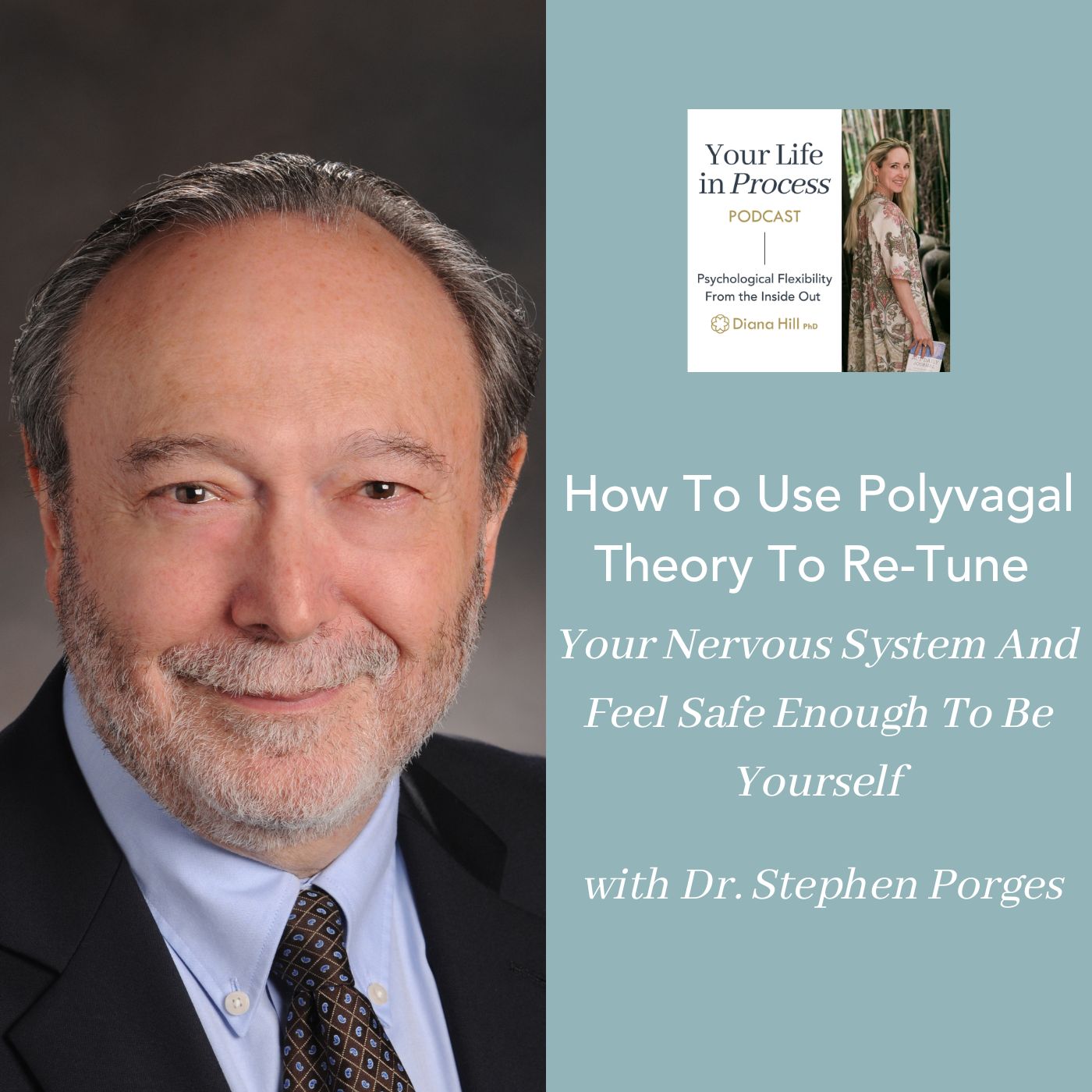According to Dr. Stephen Porges, Polyvagal theory is about the science of safety and the biology of trust. Your physiology impacts your behavior more than you think and when you feel safe, you are better able to connect with others, be bold, and be free to be yourself. In this episode, Dr. Porges and Diana Hill explore everything from how the pandemic re-tuned our nervous systems, to the intersection of ACT and polyvagal theory, chanting, rituals, and religion, and why you should rethink your botox!
Listen and Learn:
- What are the basics of polyvagal theory?
- How polyvagal theory extends beyond the anatomy of the vagus nerve
- How the pandemic re-tuned our nervous systems
- The impact of COVID on Dr. Porges
- How we co-regulate cues of safety and danger
- Why we should titrate our social engagement
- How music and sound impact our nervous system
- What Steven Hayes and Stephen Porges are talking about behind the scenes
- How our eyes, breath, and voice impact the nervous system
- Three skills to tune up your nervous system after a major stressor like COVID
About Dr. Stephen Porges
Stephen W. Porges, PhD is a distinguished university scientist at Indiana University, where he is the founding director of the Traumatic Stress Research Consortium. He is professor of psychiatry at the University of North Carolina and professor emeritus at the University of Illinois at Chicago and the University of Maryland. His more than 400 peer–reviewed scientific papers, published across several disciplines, have been cited in approximately 48,000 peer-reviewed papers. He holds several patents involved in monitoring and regulating autonomic state and originated the Polyvagal Theory, which emphasizes the importance of physiological state in the expression of behavioral, mental, and health problems related to traumatic experiences. He is the creator of the Polyvagal Theory and a music-based intervention, the Safe and Sound Protocol TM, currently used by more than 2000 therapists to reduce hearing sensitivities, improve language processing, and increase spontaneous social engagement. He is a co-founder of the Polyvagal Institute. He is the author of The Polyvagal Theory: Neurophysiological foundations of Emotions, Attachment, Communication, and Self-Regulation, The Pocket Guide to the Polyvagal Theory: The Transformative Power of Feeling Safe, and Polyvagal Safety: Attachment, Communication, Self-Regulation, and co-editor of Clinical Applications of the Polyvagal Theory: The Emergence of Polyvagal-Informed Therapies.
Related Resources
- Become a MORE Life in Process member to support the show. You’ll be designated as a “Founding Member” as we build a community to discuss ideas and our practice from the show. Founding Members receive exclusive bonus content from Diana.
- Find out what kind of Striver you are and get your free Skillful Striving Toolkit
- Want to learn more about ACT? Take Diana’s on-demand course Foundations of ACT
- Leave feedback for the show
- Try a simple chant with Diana (Ham Sa) on Insight Timer
- Listen to Diana’s first interview with Dr. Porges
- Selected Articles by Stephen Porges
- Ancient Rituals, Contemplative Practices, and Vagal Pathways by Stephen Porges
- For Members:
- Loving Awareness meditation to activate feelings of safety
Diana’s Events
- Get on the waitlist for Diana’s Reset and Restore Retreat in Costa Rica in 2023!
- Meditate with Diana at Yoga Soup
- Register for Diana’s Body Image workshop at Yoga Soup!
- Sign up for Diana’s From Striving to Thriving Summit!
- See Diana at an upcoming event
Connecting With Diana
Thank you for listening to Your Life in Process! Subscribe to the podcast for free on Apple Podcasts, Spotify, Google Podcasts. If you have any questions or feedback you can submit feedback for the show, email podcast at yourlifeinprocess dot com or leave Diana an audio message at (805) 457-2776. Follow Diana at YouTube, Instagram, LinkedIn, Facebook, and Diana’s website.
Thank you to the team Craig, Angela Stubbs, and Ashley Hiatt. Thank you to Benjamin Gould of Bell & Branch for your beautiful music.
Remember when you become psychologically flexible, you become free.

+ show comments
- Hide Comments
add a comment